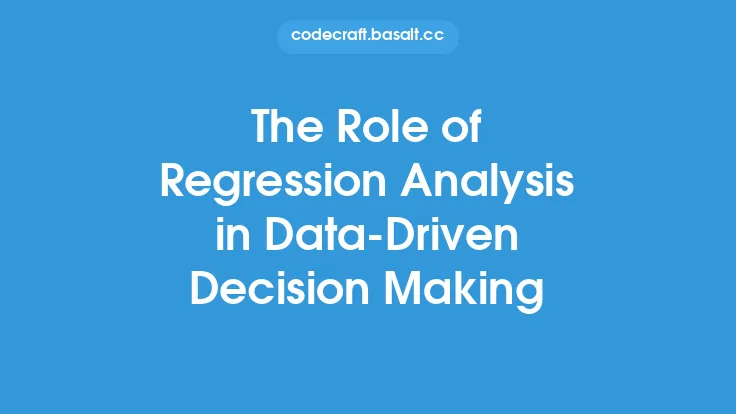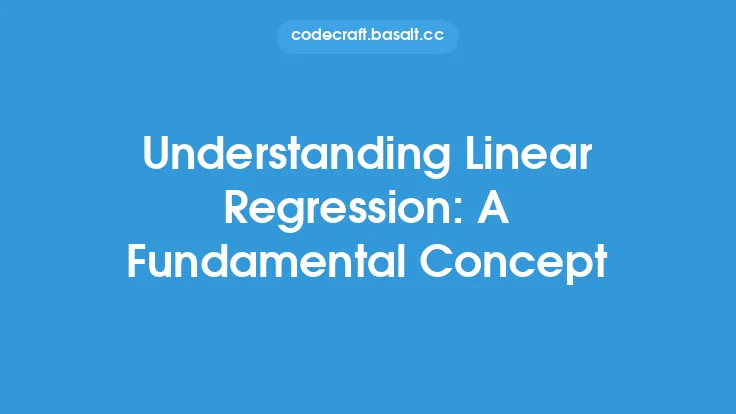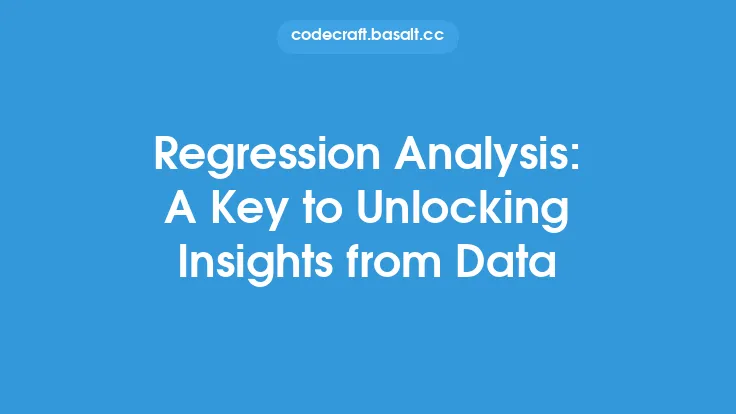Regression analysis is a fundamental concept in machine learning, and it has been widely used in various fields to establish relationships between variables. While linear regression is a well-known and widely used technique, non-linear regression techniques have gained significant attention in recent years due to their ability to model complex relationships between variables. In this article, we will delve into the world of non-linear regression techniques, exploring their concepts, types, and applications.
Introduction to Non-Linear Regression
Non-linear regression is a type of regression analysis where the relationship between the independent variables and the dependent variable is not linear. In other words, the relationship between the variables cannot be represented by a straight line. Non-linear regression techniques are used to model complex relationships between variables, such as exponential, logarithmic, or polynomial relationships. These techniques are particularly useful when the data exhibits non-linear patterns, and linear regression models are not sufficient to capture the underlying relationships.
Types of Non-Linear Regression Techniques
There are several types of non-linear regression techniques, each with its own strengths and weaknesses. Some of the most common types of non-linear regression techniques include:
- Polynomial Regression: Polynomial regression is a type of non-linear regression where the relationship between the independent variables and the dependent variable is modeled using a polynomial equation. Polynomial regression is particularly useful when the data exhibits a non-linear relationship, but the relationship is still relatively smooth.
- Logistic Regression: Logistic regression is a type of non-linear regression where the dependent variable is binary, and the relationship between the independent variables and the dependent variable is modeled using a logistic function. Logistic regression is particularly useful for binary classification problems.
- Exponential Regression: Exponential regression is a type of non-linear regression where the relationship between the independent variables and the dependent variable is modeled using an exponential function. Exponential regression is particularly useful when the data exhibits an exponential growth or decay pattern.
- Neural Network Regression: Neural network regression is a type of non-linear regression where the relationship between the independent variables and the dependent variable is modeled using a neural network. Neural network regression is particularly useful when the data exhibits complex patterns, and traditional non-linear regression techniques are not sufficient.
Non-Linear Regression Models
Non-linear regression models are used to establish relationships between variables. These models are typically represented by a mathematical equation, which describes the relationship between the independent variables and the dependent variable. Some common non-linear regression models include:
- Michaelis-Menten Model: The Michaelis-Menten model is a non-linear regression model that is commonly used to describe the relationship between the concentration of a substrate and the rate of an enzymatic reaction.
- Hill Model: The Hill model is a non-linear regression model that is commonly used to describe the relationship between the concentration of a ligand and the response of a biological system.
- Gompertz Model: The Gompertz model is a non-linear regression model that is commonly used to describe the relationship between time and the growth or decay of a population.
Estimation of Non-Linear Regression Models
Estimating non-linear regression models can be challenging, as the models are often non-linear in the parameters. Some common methods for estimating non-linear regression models include:
- Least Squares Estimation: Least squares estimation is a method for estimating non-linear regression models by minimizing the sum of the squared residuals.
- Maximum Likelihood Estimation: Maximum likelihood estimation is a method for estimating non-linear regression models by maximizing the likelihood function.
- Bayesian Estimation: Bayesian estimation is a method for estimating non-linear regression models using Bayesian inference.
Applications of Non-Linear Regression Techniques
Non-linear regression techniques have a wide range of applications in various fields, including:
- Biology: Non-linear regression techniques are used in biology to model the growth and decay of populations, the relationship between the concentration of a substrate and the rate of an enzymatic reaction, and the response of a biological system to a ligand.
- Economics: Non-linear regression techniques are used in economics to model the relationship between economic variables, such as the relationship between the price of a good and the demand for that good.
- Engineering: Non-linear regression techniques are used in engineering to model the relationship between the input and output of a system, such as the relationship between the pressure and flow rate of a fluid.
- Finance: Non-linear regression techniques are used in finance to model the relationship between financial variables, such as the relationship between the price of a stock and the return on that stock.
Challenges and Limitations of Non-Linear Regression Techniques
While non-linear regression techniques are powerful tools for modeling complex relationships between variables, they also have some challenges and limitations. Some of the challenges and limitations of non-linear regression techniques include:
- Overfitting: Non-linear regression models can suffer from overfitting, which occurs when the model is too complex and fits the noise in the data rather than the underlying pattern.
- Underfitting: Non-linear regression models can also suffer from underfitting, which occurs when the model is too simple and fails to capture the underlying pattern in the data.
- Computational Complexity: Non-linear regression models can be computationally complex, which can make them difficult to estimate and interpret.
- Interpretation: Non-linear regression models can be difficult to interpret, as the relationship between the independent variables and the dependent variable is not always straightforward.
Conclusion
Non-linear regression techniques are powerful tools for modeling complex relationships between variables. These techniques have a wide range of applications in various fields, including biology, economics, engineering, and finance. However, non-linear regression techniques also have some challenges and limitations, such as overfitting, underfitting, computational complexity, and interpretation. By understanding the concepts, types, and applications of non-linear regression techniques, researchers and practitioners can use these techniques to gain insights into complex phenomena and make informed decisions.





